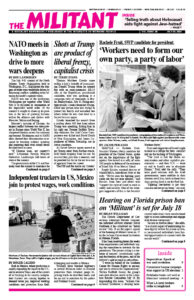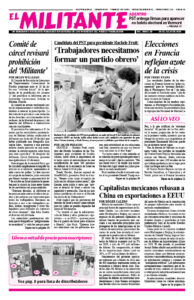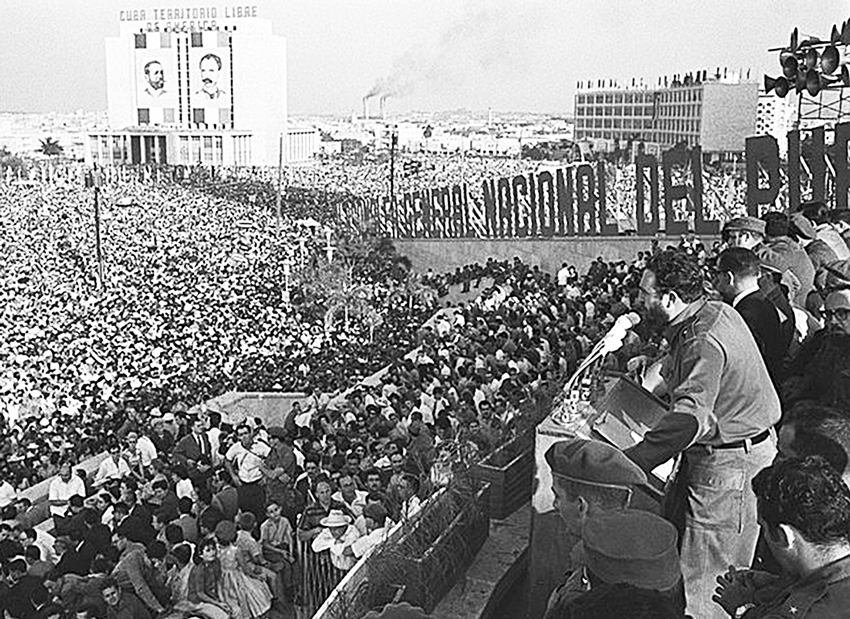The French edition of The First and Second Declarations of Havana: Manifestos of Revolutionary Struggle in the Americas Adopted by the Cuban People is one of Pathfinder’s Books of the Month for July. This coincides with the July 26 anniversary of the 1953 attack on the Moncada army barracks launching Cuba’s revolutionary struggle that triumphed six years later. Between the 1960 and 1962 declarations, both adopted by assemblies of a million Cubans, the mass struggle deepened into a socialist revolution under the leadership of Fidel Castro. The excerpt below is from “The Second Declaration of Havana.” Copyright © 2007 by Pathfinder Press. Reprinted by permission.
Cuba affronts the imperialists in a special way. What is it that is hidden behind the Yankees’ hatred of the Cuban Revolution? What is it that rationally explains the conspiracy — uniting for the same aggressive ends the richest and most powerful imperialist power in the contemporary world and the oligarchies of an entire continent, which together are supposed to represent a population of 350 million human beings — against a small country of only 7 million inhabitants, economically underdeveloped, without financial or military means that could threaten the security or economy of any other country?
What unifies them and incites them is fear. What explains it is fear. Not fear of the Cuban Revolution, but fear of the Latin American revolution. Not fear of the workers, peasants, intellectuals, students, and progressive layers of the middle strata who by revolutionary means have taken power in Cuba, but fear that the workers, peasants, students, intellectuals, and progressive sectors of the middle strata will take power by revolutionary means in the oppressed and hungry countries exploited by the Yankee monopolies and reactionary oligarchies of the Americas; fear that the plundered people of the continent will seize the arms from their oppressors and, like Cuba, declare themselves free peoples of the Americas.
By crushing the Cuban Revolution they hope to dispel the fear that torments them, the specter of revolution that threatens them. By eliminating the Cuban Revolution, they hope to eliminate the revolutionary spirit of the people. They imagine in their delirium that Cuba is an exporter of revolutions. In their sleepless merchants’ and money lenders’ minds lives the idea that revolutions can be bought, sold, rented, loaned, exported and imported like a piece of merchandise. Ignorant of the objective laws that govern the development of human societies, they believe that their monopolistic, capitalistic, and semifeudal regimes are eternal. Educated in their own reactionary ideology — a mixture of superstition, ignorance, subjectivism, pragmatism, and other mental aberrations — they have an image of the world and of the march of history conforming to their interests as exploiting classes. …
But the development of history, the ascending march of humanity, cannot, and will not, be halted. The forces that impel the people, who are the real makers of history, are determined by the material conditions of their existence and by the aspirations for higher goals of well-being and liberty that emerge when man’s progress in the fields of science, technology, and culture make this possible. These forces are superior to the will and the terror unleashed by the ruling oligarchies.
The subjective conditions of each country, the conscious factor — organization and leadership — can, according to its greater or lesser degree of development, accelerate or retard the revolution. But sooner or later, in each historic epoch, when the objective conditions mature, consciousness grows, organization develops, leadership emerges, and revolutions take place.
Whether this takes place peacefully or in painful birth does not depend on the revolutionists; it depends on the reactionary forces of the old society, who resist the birth of the new society engendered by the contradictions carried in the womb of the old. Revolution historically is like the doctor who assists at the birth of a new life. It does not use the tools of force without reason, but will use them without hesitation whenever necessary to help the birth, a birth that brings to the enslaved and exploited masses the hope of a better life.
In many countries of Latin America, revolution is today inevitable. That fact is not determined by anyone’s will. It is determined by the horrifying conditions of exploitation in which Latin Americans live, the development of the revolutionary consciousness of the masses, the global crisis of imperialism, and the worldwide movement of struggle of the subjugated peoples.
The restlessness felt today is an unmistakable symptom of rebellion. The very depths of a continent are being shaken, a continent that has witnessed four centuries of slave, semislave, and feudal exploitation beginning with its original inhabitants and slaves brought from Africa, up to the nuclei of nationalities that emerged later: white, Black, mulatto, mestizo, and Indian, who are today made brothers by scorn, humiliation, and the Yankee yoke, and are brothers in their hope for a better tomorrow. …
To the accusation that Cuba wants to export its revolution, we reply: Revolutions are not exported, they are made by the peoples.
What Cuba can give to the peoples, and has already given, is its example.
And what does the Cuban Revolution teach? That revolution is possible, that the peoples can make it, that in the contemporary world there are no forces capable of halting the liberation movement of the people. …
The duty of every revolutionist is to make the revolution. It is true that the revolution will triumph in the Americas and throughout the world, but it is not for revolutionists to sit in the doorways of their houses waiting for the corpse of imperialism to pass by. The role of Job does not suit a revolutionist. Each year that the liberation of Latin America is speeded up will mean the lives of millions of children saved, millions of intellects saved for culture, an infinite quantity of pain spared the people. Even if the Yankee imperialists prepare a bloody drama for Latin America, they will not succeed in crushing the peoples’ struggles; they will only arouse universal hatred against themselves. And such a drama will also mark the fall of their greedy and Stone Age system.


